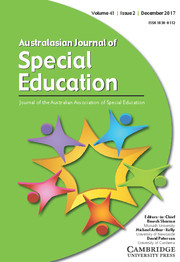No CrossRef data available.
Article contents
Daily Data Based Instructional Procedures in Arithmetic With Skill Deficient Students
Published online by Cambridge University Press: 26 February 2016
Abstract
Mildly mentally handicapped students are commonly assumed to have not only low general ability, but also slow rates of learning. It is likewise held that current skill deficits of mildly handicapped students predict low potential. A classroom implementation of data based instruction or precision teaching, showed that groups of skill deficient children were able to progress and substantially change their current level of functioning along a series of teacher developed task analysed arithmetic sequences, after instruction.
- Type
- Research Article
- Information
- Copyright
- Copyright © The Australian Association of Special Education 1982




